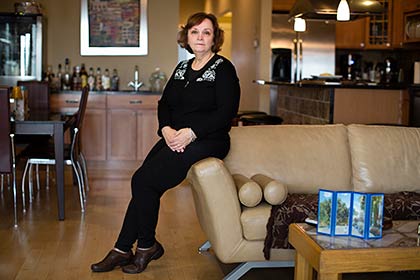AARP Hearing Center

By Rochelle Sharp
The first hint that Sheila Starr’s life would go into a tailspin seemed innocuous: scraps of paper in her mother-in-law’s car with directions to familiar places like her supermarket.
At first, Sheila and her husband, Mitchell, simply increased how often they visited Ruth Starr, now 89, at her home in Braintree.
After a few years, though, they decided Ruth needed more help and moved her into their South Boston home in 2011 for what they expected would be a brief interlude before Ruth moved to an independent living community.
But those plans derailed when the facility manager said Ruth was not capable of living there because of her fading memory.
The Starrs soon realized someone needed to be with Ruth all the time.
So Sheila, 61, sold the day spa she had owned for 20 years and started spending her days in a blur of “exhausting turmoil,” preparing meals, giving her mother-in-law showers and reminding her about basic things she could no longer remember, such as how to brush her teeth.
Many unaware of help
Like many in the boomer generation who have found themselves called on to provide care for their parents earlier than expected, the Starrs had no idea there are programs that could help with relentless caregiving duties.
For instance, they shouldered all Ruth’s care for more than a year before learning of adult day care and that they could get financial support from the state as Ruth’s primary caregivers.
“Caregivers shouldn’t feel like they have to go it alone,” said Sheila Donahue King, director of the family caregiver support program in the state’s Executive Office of Elder Affairs.
The 27 elder care agencies in Massachusetts, known as Aging Services Access Points (ASAP), provide services, resources, information and education for older people and caregivers.
Services range from in-home assessments about how best to care for a frail elderly loved one to classes on managing stress. Many services are free or provided at subsidized fees, depending on the care recipient’s income.
More than 850,000 Massachusetts residents provided unpaid care for family members in 2009, according to the AARP Public Policy Institute, which said the value of the care was nearly $11 billion.
“Unpaid family members are the backbone of America’s long-term care system,” said Mike Festa, AARP Massachusetts state director.
The first step for many Massachusetts caregivers seeking help is a hotline (800-243-4636) or website cosponsored by the Executive Office of Elder Affairs and the Mass Home Care Association, a network of 30 nonprofit aging information centers.
Caregivers are connected to the ASAP in their area for an explanation of available assistance, including home-delivered meals, free or subsidized transportation, support groups and money management programs.
Adult day programs
Massachusetts has an adult foster care program, which can pay family caregivers up to $18,000 a year to help defray caretaking expenses.
In addition, many caregivers take advantage of adult day programs, which provide supervised activities while the caregiver goes to work or takes a break.
One ASAP organization, Boston Senior Home Care, offers a free six-week class based on the “Powerful Tools for Caregivers” program, which includes information on decision-making, communication strategies and remembering to take care of themselves.
“People get so consumed with caring for a loved one that they forget about themselves,” said Abigail Mojica, Boston Senior Home Care’s director of client services.
The AARP Caregiving Resource Center has tips, tools and information to help family caregivers.
Rochelle Sharpe is a writer living in Brookline, Mass.































































